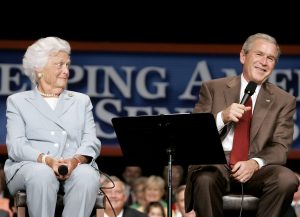
By Will Dunham
(Reuters) – Former U.S. first lady Barbara Bush, the only woman to see her husband and son both sworn in as president, died on Tuesday, the Bush family said. She was 92.
Bush was the wife of the 41st president, George H.W. Bush, and mother of the 43rd, George W. Bush.
The Bush family had said in a statement on Sunday that she was in failing health, had decided not to seek further medical treatment and instead would focus on “comfort care.”
According to some media reports, Bush had been battling chronic obstructive pulmonary disease and congestive heart problems in recent years.
“Barbara Bush was a fabulous First Lady and a woman unlike any other who brought levity, love and literacy to millions,” George W. Bush said in a statement. “To us, she was so much more. Mom kept us on our toes and kept us laughing until the end.”
Dubbed “The Silver Fox” by her husband and children, Bush was known for her snow-white hair and for being fiercely protective of her family.

FILE PHOTO: U.S. President George W. Bush (R) waves alongside his parents, former President George Bush and former first lady Barbara Bush upon their arrival Fort Hood, Texas, April 8, 2007. REUTERS/Jason Reed /File Photo
She was first lady when her husband was in the White House from 1989 to 1993. Her son, Republican George Walker Bush, triumphed in the disputed 2000 U.S. election and was president from 2001 to 2009. The father-and-son presidents were sometimes referred to as “Bush 41” and “Bush 43.”
The Bushes celebrated their 73rd wedding anniversary in January.
Bush had an independent streak and could be sharp-tongued. As first lady, she promoted literacy and reading but said she was more interested in running a household than helping her husband run the country.
She discouraged speculation that she wielded political influence with the president like her predecessors – Ronald Reagan’s wife, Nancy Reagan, and Jimmy Carter’s wife, Rosalynn Carter.
“I don’t fool around with his office and he doesn’t fool around with my household,” she once said.
“She’ll speak her mind but only to him,” said Jack Steel, a longtime Bush aide.
‘HUMILITY AND DECENCY’
President Donald Trump and former Democratic Presidents Barack Obama and Bill Clinton were among those praising the late first lady.
“She will be long remembered for her strong devotion to country and family, both of which she served unfailingly well,” Trump and his wife, Melania, said in a statement that noted Bush’s championing of literacy “as a fundamental family value.”
Clinton, who defeated her husband in the 1992 presidential election, called Bush “fierce and feisty in support of her family and friends, her country and her causes. She showed us what an honest, vibrant, full life looks like.”
Obama and his wife, Michelle, said in a statement that Barbara Bush was “an example of the humility and decency that reflects the very best of the American spirit.”
The only other woman to be both wife and mother of U.S. presidents was Abigail Adams, the first lady from 1797 to 1801. She was a major influence on husband John Adams, the nation’s second president, but died before son John Quincy Adams was elected president in 1824.
Another of Bush’s sons, Jeb, who served as governor of Florida from 1999 to 2007, sought the 2016 Republican presidential nomination and she campaigned for him before he dropped out of the race.
The Bushes had six children. A daughter, Robin, died of leukemia in 1953 at age 3. Barbara Bush’s hair began to turn prematurely white after the shock of the girl’s death. In addition to George W. and Jeb, the other Bush children were sons Neil and Marvin and daughter Dorothy.
The Bushes married on Jan. 6, 1945, and Barbara set up households in numerous cities as her husband moved from being a Texas oilman to being a member of Congress, Republican Party leader, U.S. envoy to China and the United Nations and head of the Central Intelligence Agency.

FILE PHOTO: U.S. President George W. Bush (R) jokes with his mother, Barbara Bush, while speaking about Medicare at the Boisfeuillet Jones Atlanta Civic Center in Atlanta, Georgia, July 22, 2005. REUTERS/Larry Downing/File Photo
‘RHYMES WITH RICH’
Barbara Bush sometimes made biting remarks, particularly when she felt the need to defend her husband. One notable example came in 1984 when George H.W. Bush was seeking re-election as vice president under Reagan, a post he held from 1981 until becoming president in 1989.
She told reporters that Geraldine Ferraro, her husband’s Democratic rival for the vice presidency, was a “4 million dollar … I can’t say it but it rhymes with ‘rich.'” She apologized to Ferraro, the first woman running for U.S. vice president on a major-party ticket.
Texas Governor Ann Richards mocked her husband at the 1988 Democratic convention – saying: “Poor George … was born with a silver foot in his mouth” – and Barbara henceforth referred to Richards as “that woman.”
In 2012, Bush dismissed the political ambitions of U.S. conservative darling Sarah Palin, saying: “I think she’s very happy in Alaska – and I hope she’ll stay there.”
Bush generally refused to discuss publicly her personal views on controversial topics such as abortion, an issue on which she was believed to differ from her husband’s more conservative stance.
But during her husband’s 1992 re-election race, she told reporters that abortion and homosexuality were “personal things” that should be left out of political conventions and party platforms. “I don’t think that’s healthy for the country when anyone thinks their morals are better than anyone else’s,” she said.
Opinion polls often showed her popularity as first lady exceeding her husband’s as president. “I don’t threaten anyone,” she said. “That’s because I’m everyone’s grandma.”
PUBLISHER’S DAUGHTER
A year younger than her husband, she was born Barbara Pierce on June 8, 1925, and grew up in Rye, New York. Her father was Marvin Pierce, publisher of McCall’s magazine.
She was home from boarding school in 1941 when she met her future husband at a Christmas party in Connecticut. She dropped out of prestigious Smith College to marry Bush, then a young naval aviator home on leave from World War Two.
George Bush said marrying Barbara, whom he called “Bar,” was “the thing I did right.” But the marriage nearly did not take place. While they were engaged, his bomber was shot down by the Japanese in the Pacific in 1944. He bailed out and was rescued in the ocean by a submarine crew, but his crewmates died.
“When you’re 18, you think everybody is invincible. … I mean, that was stupid – but I knew he was going to come home. He was Superman,” she told CNN in 2003.
After leaving the White House, she found time to write her memoirs. In 1990, she authored “Millie’s Book,” a humorous look at the adventures of the family’s English springer spaniel in the White House.
In one of their last public appearances, the Bushes attended the 2017 Super Bowl in Houston, with George performing the ceremonial pregame coin flip. Only a few days before, the couple had been released from a hospital where George had been treated for pneumonia and Barbara for bronchitis.
(Reporting by Will Dunham in Washington; Additional reporting by Howard Schneider; Editing by Diane Craft and Peter Cooney)








